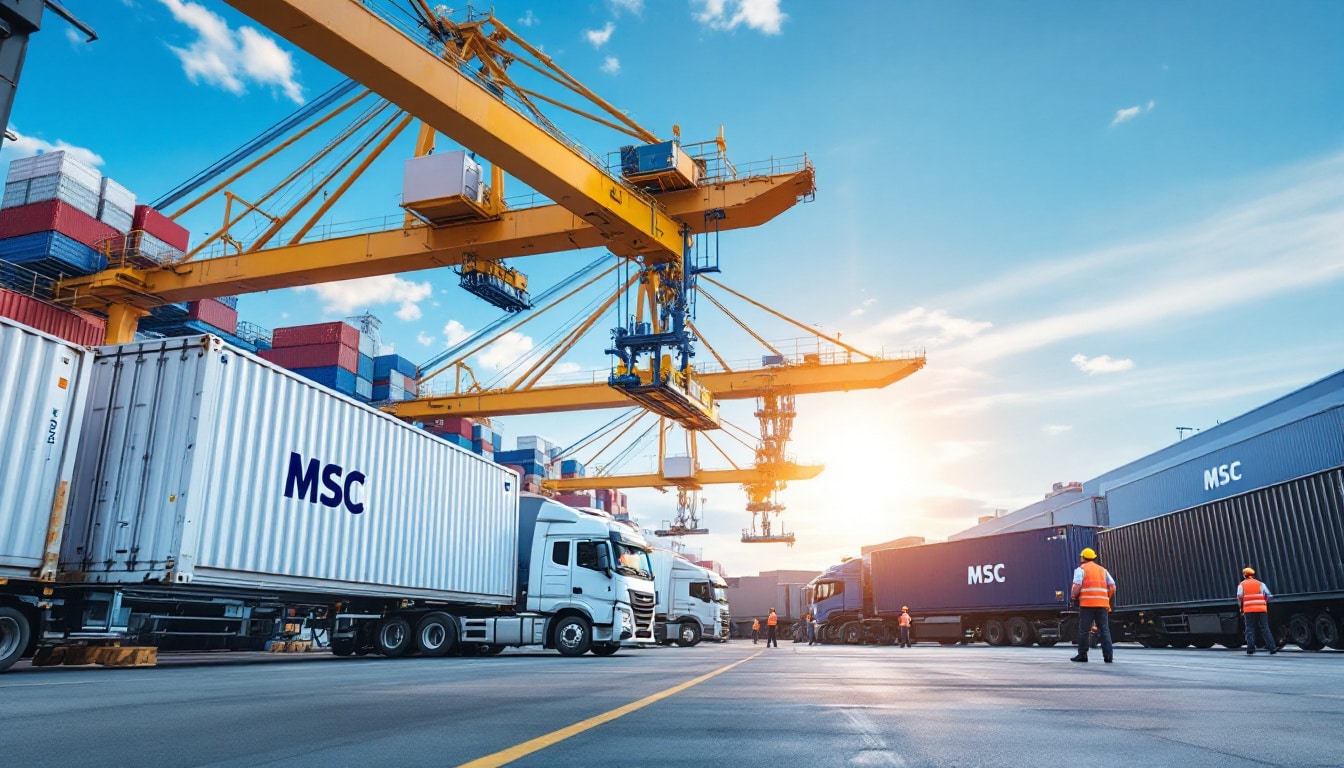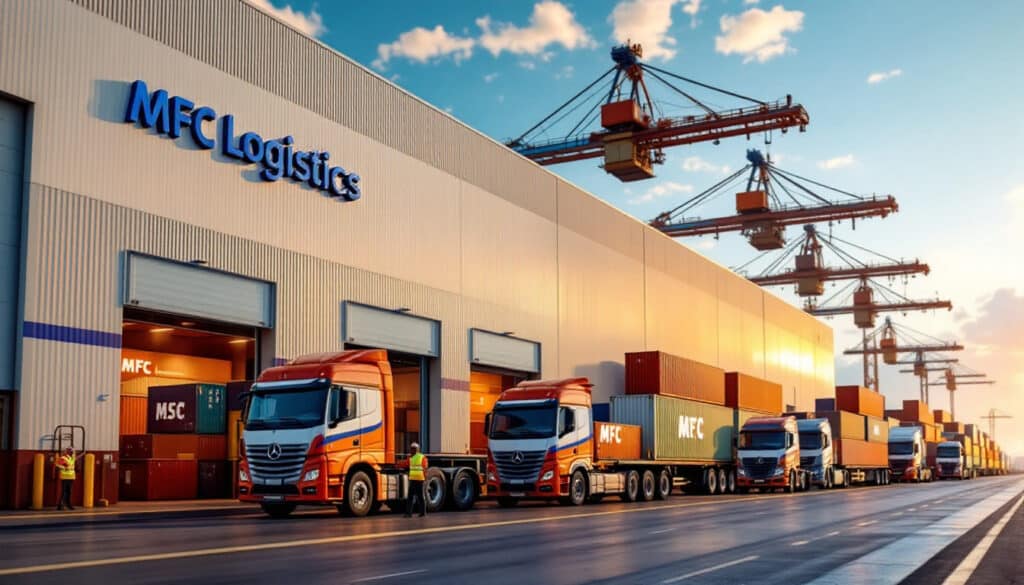We use cookies and data to deliver and maintain Google services.
They help track outages and protect us against spam, fraud, and abuse.
These tools also measure public engagement and site statistics to understand how our services are used and improve their quality.
By choosing “Accept all,” we will also use cookies to develop and improve new services, deliver and measure the effectiveness of advertising, as well as display personalized content and advertisements based on your settings. If you prefer “Reject all,” we will not use cookies for these additional purposes. The non-personalized content is influenced by the content you are currently viewing, your activity during your search session, and your location.

Table of Contents
ToggleWhat is a subsidiary of MSC?
MSC, or Mediterranean Shipping Company, is one of the largest shipping companies in the world. With an impressive fleet and a global presence, MSC stands out for its commitment to innovation and sustainability. A subsidiary of MSC is a distinct legal entity that operates under the aegis of the parent company while focusing on specific segments of the maritime market. These subsidiaries allow MSC to diversify its services, explore new markets, and adapt its operations to local needs.
By relying on specialized subsidiaries, MSC can offer comprehensive and customized logistics solutions to its clients. These subsidiaries play a crucial role in managing daily operations, maintaining ships, and developing new and sustainable technologies. Thanks to this structure, MSC enhances its ability to respond quickly to market changes and maintain a high level of service.
The creation of subsidiaries also allows MSC to integrate diverse expertise, thus fostering innovation. For example, a subsidiary dedicated to intermodal logistics may focus on optimizing multimodal supply chains, ensuring a smooth transition between marine, rail, and road transportation. This specialization contributes to improved operational efficiency and reduced costs while providing a better experience for customers.
Moreover, MSC’s subsidiaries play an essential role in implementing the company’s sustainability policies. By working on specific initiatives, such as reducing carbon emissions or adopting green technologies, these entities enable MSC to progress toward its environmental goals. This decentralized approach also fosters greater local accountability and better adaptation to regional regulations.
In summary, a subsidiary of MSC represents a strategic extension of the parent company, offering specialized expertise and operational flexibility. This organizational structure is a critical pillar of MSC’s continued growth in a constantly evolving maritime sector, where innovation and responsiveness are key success factors.
Who is COFC Logistics and what is its role in intermodal?
COFC Logistics is a renowned American intermodal provider known for its efficient and innovative logistics solutions. Specializing in multimodal transport, COFC Logistics integrates various modes of transport such as rail, truck, and maritime transport to offer optimized freight transportation services. The company stands out for its ability to manage complex supply chains, ensuring smooth coordination between the different transportation segments.
The role of COFC Logistics in intermodal is fundamental for companies looking to improve their logistics efficiency. By combining multiple modes of transport, COFC Logistics reduces delivery times, minimizes costs, and increases shipment reliability. This intermodal approach also helps reduce the carbon footprint of transportation operations by optimizing resource utilization and promoting more sustainable modes of transport.
COFC Logistics distinguishes itself with its advanced use of technology to optimize intermodal operations. The company employs sophisticated transportation management systems (TMS) to track shipments in real-time, anticipate potential disruptions, and respond quickly to changing conditions. This ability to integrate technology into its operational processes allows COFC Logistics to provide high-quality services and maintain a competitive position in the market.
In addition, COFC Logistics offers customized solutions tailored to the specific needs of each client. Whether for domestic or international shipments, the company provides bespoke services that meet the unique requirements of each industry. This flexibility and attention to detail make COFC Logistics a trusted partner for many businesses seeking efficient and reliable logistics solutions.
Finally, COFC Logistics’ expertise in regulatory compliance and risk management strengthens its position in the intermodal sector. The company ensures that all operations comply with local and international standards, thereby guaranteeing the safety and reliability of transportation. This rigor in managing processes and standards provides COFC Logistics’ clients with peace of mind and increased trust in their logistics operations.
What are the reasons behind MSC’s acquisition of COFC Logistics?
The acquisition of COFC Logistics by a subsidiary of MSC is part of a broader strategy aimed at strengthening MSC’s position in the intermodal logistics sector. Several factors motivate this strategic decision, which aims to optimize operations and expand MSC’s capabilities in the global market.
Firstly, integrating COFC Logistics allows MSC to expand its logistics service portfolio. By incorporating advanced intermodal solutions, MSC can offer its clients a more comprehensive and integrated range of services. This synergy enhances the added value for clients by providing end-to-end solutions, from maritime transport to final delivery via land or rail.
Next, the acquisition of COFC Logistics brings specialized expertise in the intermodal field, enabling MSC to improve the efficiency and flexibility of its logistics operations. COFC Logistics is recognized for its ability to manage complex supply chains and optimize transport routes, thereby enhancing MSC’s operational efficiency. This complementary expertise allows MSC to streamline its processes and reduce costs while improving the quality and speed of the services offered.
Another key factor is access to COFC Logistics’ established logistics networks. With a strong presence in the United States and other strategic regions, COFC Logistics enables MSC to strengthen its presence in key markets and exploit new growth opportunities. This strategic geographic expansion contributes to diversifying MSC’s revenue sources and reducing reliance on specific markets.
Moreover, the acquisition aligns with MSC’s sustainability and social responsibility goals. COFC Logistics shares the same values regarding sustainable development, notably through reducing carbon emissions and improving the energy efficiency of logistics operations. By combining their efforts, MSC and COFC Logistics can implement more ambitious environmental initiatives and significantly contribute to the transition to more sustainable logistics practices.
Finally, this acquisition strengthens MSC’s competitive position against other giants in the maritime and logistics sector. By integrating COFC Logistics, MSC increases its capacity to innovate and respond rapidly to market changes. This agility is essential for maintaining a competitive edge and meeting the growing client expectations for integrated and personalized logistics services.
What impact will this acquisition have on the intermodal market?
The acquisition of COFC Logistics by a subsidiary of MSC is likely to provoke significant changes in the intermodal market. This strategic operation could redefine industry standards and influence competitive dynamics in several ways.
Firstly, this acquisition strengthens MSC’s ability to offer integrated and competitive logistics solutions. By combining the strengths of MSC and COFC Logistics, the company can propose more comprehensive and efficient services, better meeting the varied needs of clients. This consolidation of intermodal services positions MSC as an indispensable leader in the sector, thus influencing the expectations of clients and competitors.
Furthermore, the integration of COFC Logistics’ networks and infrastructures improves MSC’s geographic coverage and operational capacity. This expansion allows for optimizing transport routes and reducing delivery times, offering a notable competitive advantage. Clients benefit from faster transactions and lower logistics costs, thereby enhancing MSC’s competitiveness in the global market.
Additionally, the acquisition could stimulate innovation in the intermodal sector. MSC, with COFC Logistics’ technological capabilities, could develop new technologies and advanced logistics solutions. For instance, increased use of artificial intelligence and transportation management systems (TMS) could improve route planning, inventory management, and demand forecasting, making operations more efficient and resilient to market fluctuations.
Moreover, this acquisition could influence environmental practices in the intermodal sector. MSC and COFC Logistics share a commitment to sustainability, and their collaboration could lead to joint initiatives to reduce the carbon footprint of logistics operations. The adoption of green technologies and optimization of transport routes are examples of joint efforts that could become industry standards, pushing other players to follow this path towards more environmentally friendly logistics.
Finally, the acquisition of COFC Logistics by MSC could prompt broader consolidation in the intermodal sector. Competitors may be led to merge or form partnerships to maintain their market position against MSC’s expansion. This trend could lead to a restructuring of the sector, with major players increasingly dominating the global logistics scene.
How will this acquisition strengthen MSC’s position in marine technology?
The acquisition of COFC Logistics by a subsidiary of MSC represents a strategic advancement to strengthen MSC’s position in the field of marine technology. This operation allows MSC to integrate advanced technologies and innovative practices, thereby improving its operational capabilities and competitive advantage.
One of the primary ways this acquisition strengthens MSC’s technological position is through the integration of COFC Logistics’ advanced logistics solutions. By combining COFC’s transportation management technologies with those of MSC, the subsidiary can develop more sophisticated systems for route planning, cargo management, and real-time ship tracking. These technological enhancements allow MSC to optimize the efficiency of its maritime operations and reduce operational costs.
In addition, COFC Logistics brings valuable expertise in intermodal transport, enabling MSC to develop more robust integrated logistics solutions. Optimizing multimodal supply chains is crucial for improving MSC’s capacity to manage larger transport volumes and meet the growing client demands for speed and reliability. This expertise enhances MSC’s ability to offer high-quality services and maintain a lead over its competitors.
The acquisition also facilitates the adoption of green and sustainable technologies in MSC’s maritime operations. COFC Logistics shares MSC’s commitment to sustainability, enabling closer collaboration in developing and implementing environmentally friendly solutions. The use of alternative fuels, improving the energy efficiency of ships, and adopting emissions management systems are just a few initiatives made possible through this acquisition.
Moreover, integrating COFC Logistics’ technologies contributes to improving cybersecurity and resilience of MSC’s IT systems. Data protection and securing logistics networks are essential priorities in an increasingly digital world. With COFC Logistics’ expertise in this area, MSC can enhance the security of its systems and ensure the continuity of its operations in the face of cyber threats.
Finally, the acquisition drives innovation within MSC by fostering collaboration between the technology teams of both companies. This synergy allows for the development of new technologies and optimization of existing processes, thus accelerating the pace of innovation within MSC. By investing in research and development, MSC can continue to innovate and offer cutting-edge technological solutions that meet the evolving needs of the maritime industry.
What are the future prospects for COFC Logistics under MSC?
With the acquisition by a subsidiary of MSC, COFC Logistics finds itself at a decisive turning point that opens new prospects for its future. Integrated within a shipping giant, COFC Logistics is well-positioned to benefit from increased resources, expanded expertise, and new growth opportunities.
One of the main future prospects for COFC Logistics is the expansion of its logistics services on a global scale. Supported by MSC’s vast infrastructure, COFC Logistics can extend its intermodal transport network into new regions, thus increasing its capacity to serve emerging markets and meet the growing demand for integrated logistics services. This geographic expansion will allow COFC Logistics to grow its client portfolio and diversify its revenue sources.
Moreover, integration with MSC opens opportunities for the development of new technologies and innovative logistics solutions. By collaborating with MSC’s technology teams, COFC Logistics can invest more in research and development, exploring areas such as automation, artificial intelligence, and predictive analytics. These technological investments will enable COFC Logistics to stay at the forefront of innovation and provide increasingly efficient logistics services tailored to client needs.
The acquisition also allows COFC Logistics to strengthen its commitment to sustainability and responsible practices. With MSC’s support, COFC Logistics can intensify its initiatives to reduce carbon emissions, optimize transport routes, and adopt green technologies. These efforts will not only improve COFC Logistics’ environmental footprint but also respond to the growing expectations of clients and regulators regarding ecological responsibility.
Furthermore, COFC Logistics will benefit from MSC’s expertise and best practices in management and operations. This synergy will enhance operational efficiency, reduce costs, and improve service quality. By adopting MSC’s high standards, COFC Logistics can offer more reliable and competitive services, further strengthening its position in the intermodal market.
Finally, the acquisition opens opportunities for commercial synergies and strategic partnerships. COFC Logistics, as a subsidiary of MSC, will be able to collaborate with other entities within the group to develop combined offerings and explore new market segments. This inter-company collaboration will encourage the creation of comprehensive and integrated logistics solutions tailored to the diverse needs of clients and capable of meeting the complex challenges of the modern supply chain.









